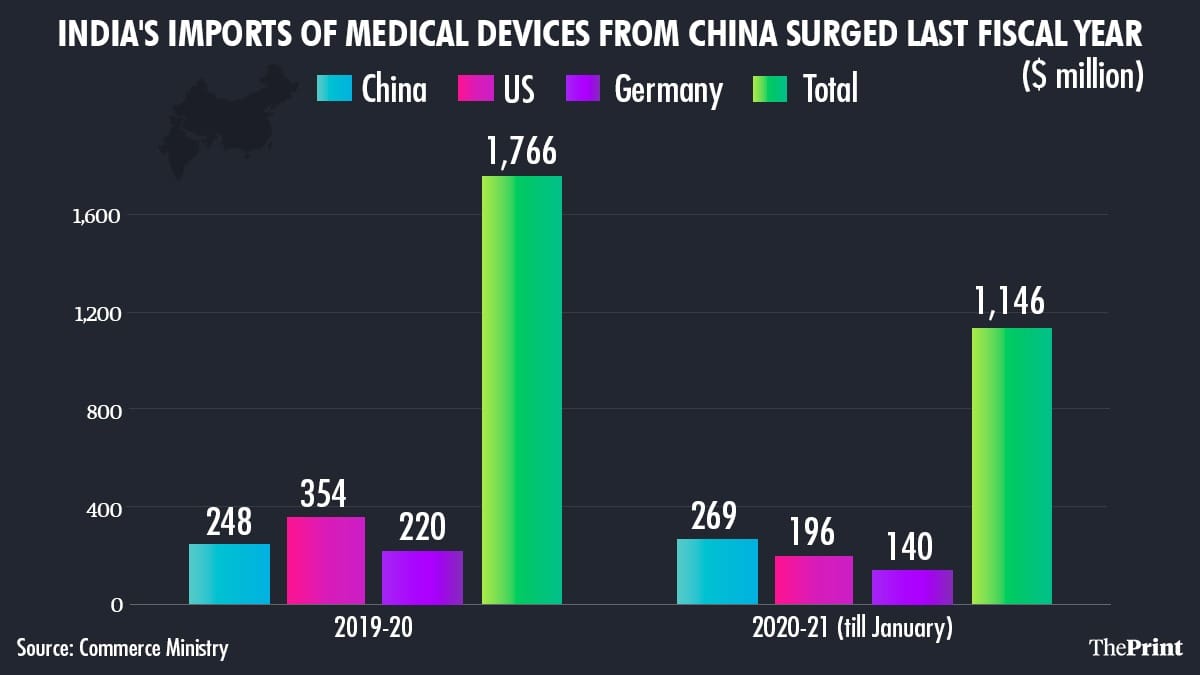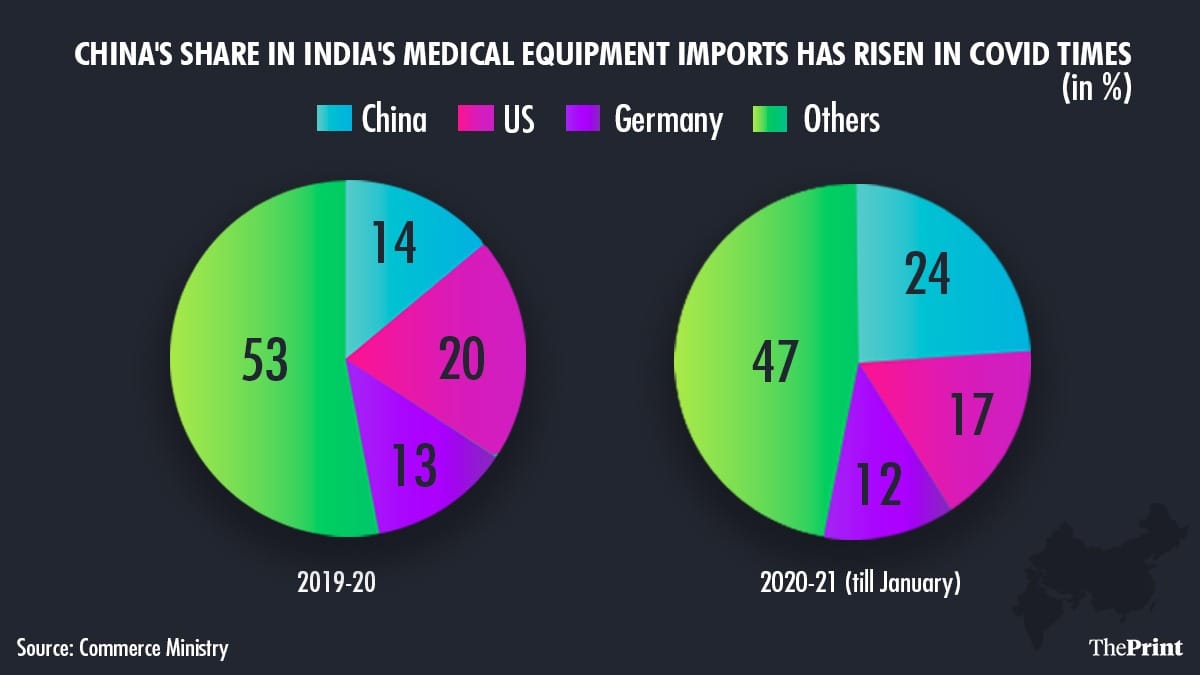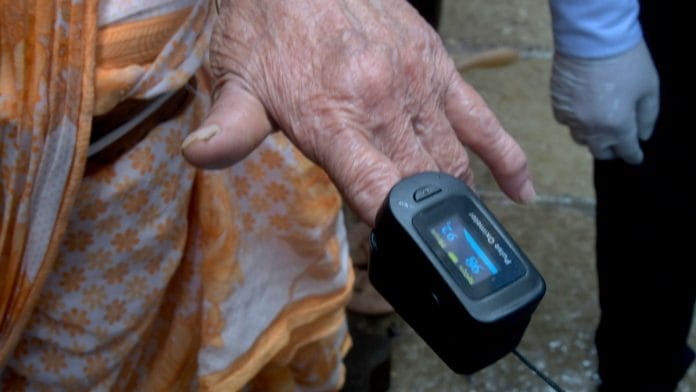New Delhi: Pulse oximeters, the bite-sized devices that help monitor your oxygen levels, have emerged as key tools in the Covid pandemic by guiding patients on when they need medical attention (a reading of 94-98 is usually considered normal).
In India, Chinese imports dominate the pulse oximeter market, with an estimated 98 per cent coming in from across the border. While the Ladakh stand-off between India and China stoked a sentiment of protest against Chinese goods last year, chemists say they have experienced no such concern with oximeters.
The surge in Covid cases has seen oximeters fly off the shelves, resulting in shortages in several cities, and people are glad to purchase whichever brand comes their way, chemists add.
The price for oximeters in India ranges between Rs 2,000 and 3,000, with the Chinese brands a tad cheaper than the ones manufactured in India. ‘Made in China’ oximeter brands that are available in stores — online and offline — include Unaan, HealthSense, Smart Saver, iSpares, Yobekan, Dr Vaku, ChoiceMMed, HealnHealthy, LANDWIND, T Topline and Lionix, according to industry representatives.
Other brands available in the country include BPL, a prominent Indian name, besides the German Breur and the US’ Dr Trust.
Although a major player in the pharma sector, India is heavily dependent on imports as far as medical devices are concerned.
Individual import figures for oximeters weren’t available on the Union Ministry of Commerce website but government data shows Chinese goods dominate India’s medical equipment purchases from abroad.
In the first 10 months of 2020-21, until January, India imported medical equipment worth $269 million from China. This translates to nearly a quarter of India’s total medical equipment imports for the period.
Industry insiders in the pulse oximeter market cite unavailability of raw materials as the prime issue why their manufacturing has not taken off in India just yet. Importing them is just cheaper, they say.
ThePrint reached the spokesperson of the department of pharmaceuticals by email and WhatsApp for a comment on this report, but there was no response by the time of publishing.
Also Read: Has India become China’s colony? Seems like, going by what we import and what we export
‘No one cares if oximeter Indian or Chinese’
Mahesh Kumar, a chemist in Navi Mumbai, says right off the bat that Chinese oximeters dominate the Indian market but adds that this is not a factor that affects buyers.
“There are a few local ones in the market but the supply is not much. No one is bothered about whether the oximeter is India-made or China-made. With a massive shortage, focus is only on buying one,” he added.
K.K. Nair, who runs a medical shop in Thrissur, echoed Kumar’s views. “Demand has surged and there are not enough oximeters in the market. People want to buy oximeters and are only bothered about the quality of the product and not about whether it is Chinese,” he said.
A look at the trade data available with the Union Ministry of Commerce shows that India still remains largely dependent on China for meeting its medical equipment requirements.
India’s imports of medical equipment and instruments, including those used for testing, from China were higher in the 10 months ending January 2021 as against the entire 2019-20 fiscal.

The share of Chinese imports in the category of medical equipment also rose in comparison to other countries like the US and Germany. China’s share in imports under this category was 24 per cent, as against the United States’ 17 per cent and Germany’s 12 per cent.

Specific to oximeters, there is no HSN code — universally accepted classification codes for various items imported and exported between countries. However, a look at the eight-digit classification of ‘Other surgical instruments and appliances’ shows that imports from China were 50 per cent higher in value in the 10 months ending January 2021, as against those in the whole of 2019-20.
The surge in imports in quantity terms was much higher, at 20,990 per cent.
Jinang Dhami, the CEO of Mumbai-based Mitocon Biomed, an indigenous oximeter manufacturer, said the composition of the oximeter market is highly skewed in India. “Around 98 per cent of the products being sold are imported from China and only about 2 per cent are assembled or made in India,” he said.
Distributors say the reason India-made oximeters are not as widely available is that the raw material required to make them is not available in the country easily. Chinese products, they add, are cheaper.
Dhami said the oximeters they produce go through three stages of testing and simulations, but claimed that most of the other purportedly India-made oximeters “are white-labeled”.
“This means they are imported from China and labeled ‘Made in India’. In addition, the lack of government regulations has made the product a tad unreliable,” he added.
“Other medical devices that are regulated are to be monitored for side-effects or malfunctions and these things are reported to the authorities concerned regularly. We are yet to see such regulation in the oximeter industry.”
Also Read: Why the small pulse oximeter is becoming a major tool for doctors in Covid-19 crisis
‘Massive shortage of oximeters’
Chemists and manufacturers point out that the current Covid-19 crisis has resulted in a massive shortage of oximeters across the country, hardly leaving any choices for consumers.
The demand for oximeters has doubled in the national capital, said Sandeep Nangia, the president of Delhi’s Retailers and Distributors Chemist Association.
“In 2020, when the pandemic hit the nation, a large number of oximeters were imported from China. In the months following this peak, the demand for oximeters fell and people who had imported in bulk had to sell these products for a cheaper price. After facing massive losses, pharmacists decided to not import oximeters,” he said.
But the spurt in demand is again leading to a surge in imports, he added.
Although there are a few small companies that are producing indigenous oximeters, their quality can’t be vouched for, he said.
Most of the known oximeter brands are out of stock across many e-commerce websites, say industry experts, adding that the situation is the same across chemists.
“If you open Amazon or Flipkart, who were previously giving a discount on oximeters, are now selling on MRP,” said Dhami.
“We are also stocked out right now and there is no scope for quick production as certain parts of the device we make need to be imported from China or Taiwan. Even the raw material distributors there are booked and have no spares to export. The supply will only pick up in a week or two once the raw materials start coming in,” he added.
(Edited by Sunanda Ranjan)
Also Read: Oximeter sales soar but there is no guarantee of accurate reading and ‘no govt regulations’







Because the idiot like you and your website did not tell that we have Indian variant called
“TUSHTI” Brand In Market that is Made in India.
I have emailed a similar research article raising concern regarding regulatory mechanism to the Print a few days ago. The email was sent on 28th April to shekhargupta@theprint.in and feedback@theprint.in with a request to publish the article. I still look forward to it. We can deal with oximeter price issue more comprehensively with real effect by raising such issues.
To aware people and to push regulatory authorities to act.
Shame on the author of this article. That in this time also they look out for such things.
This is the real face of liberals.
The growing nature of pleasure seeking n pains avoiding in the country is responsible for easy n shirt cut routes in every walk of life. Scientific research, innovations in the country r no exception.
Authors please don’t get tricked by marketting gimic of Dr.Trust USA. It is not of USA. It’s just a brand line of Nureca, whose IPO came out recently. They outsource manufacturing to Chins, only assemble in India. White labelled as mentioned in the article.
Thanks nice for it.
Bhai chinese ho ya Indian samay ye dekhne ka nahi h chutio, jaan bachane ka h, firr machine kaha ki vi ho phle jinda bach jaao agle janam me indian chinese ratlena
I do not think that this article was required at all!! When in case of emergency of life, will people look for location of origin of device or see whether it meets his requirements? Does the author expect that a guy would say that he won’t buy an Oximeter just because it orginates from China!! This is a no brainer story which is not upto the standard of ThePrint or Ms. Remya Nair. I respect her for her other indepth analysis and reportage.
The great economists in the globalized trade saw Indian opportunity, allowing people to have things cheap while money was being made left right and center for themselves and their cronies. This was the cock-eyed vison. Never used the cheap goods phase to build our own competitive capacities.